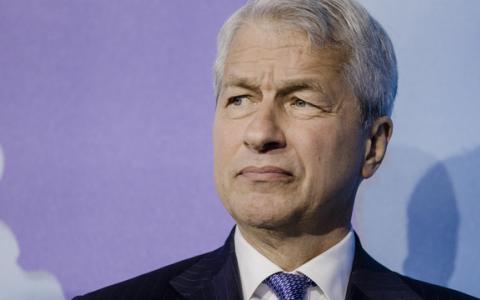
(Fortune) - JPMorgan Chase CEO Jamie Dimon is rarely among the most optimistic voices on Wall Street—and despite the rosy data coming out of the American economy, he's not convinced.
Analysts have been buoyed by better-than-expected labor reports, the resilience of the consumer and hints by Fed chairman Jerome Powell that rates may begin to come down this year.
This may suggest a "goldilocks" scenario—some economists believe—where the data is neither too hot to lead to rampant inflation nor too cold to grind corporate profits to a halt.
While some bearish voices have been forced to admit they were too negative, Dimon isn't satisfied by bullish arguments that the market will sail through the next few years without a hitch.
Already, the top-paid banking boss has sounded the alarm on the level of government debt, agreeing it's the "most predictable crisis" currently facing the U.S. economy. This eventuality is some way off, Dimon told the Bipartisan Policy Centre last month, but this week suggested there may be other bumps in the road in the shorter term.
At JPMorgan's High Yield and Leveraged Finance conference in Miami this week, Dimon said 2024 had been "so far, so good" with M&A chatter increasing and confidence continuing to grow.
But "markets change their mind pretty quickly," Dimon told CNBC's Fast Money Halftime Report. He added: "Remember in 1972 you felt great too. And before any crash, you felt great, and then things change."
Indeed, although the 1970s began with some positive stories about growing employment levels and fiscal stimulus, it swiftly gave way to rampant inflation, a recession and interest rates being hiked to more than 16% by 1981.
Dimon isn't the first to fear a return to 50 years ago: in October Deutsche Bank also wrote it sees ‘a striking number of parallels’ with the 1970s.
"You've got to look ahead," continued Dimon—who was paid a record $36 million for his work in 2023. "I do think there are things out there which are kind of concerning [that] we have got an eye on." The Wall Street titan has been open about which factors he thinks may prove a surprise: inflation being stickier than expected, government debt and geopolitics to name a few.
Dimon added that the reason the economy was fairing so well at the moment is thanks to fiscal spending and the multiplier effect from that, but added: "The market is kind of pricing a soft landing, that may very well happen. The odds are 70 or 80—I would give them half of that."
He added the U.S. may "very well" have a soft landing but said: "There's also a higher chance than the market thinks of rates being a little bit higher."
Additionally, Dimon said: "It’s always a mistake to look at just the year. All these factors we talk about: Q.T., fiscal spending, deficits, the geopolitics, those things may play out over multiple years, but they will play out and they will have an effect, and we just don’t know what they are. So I’m kind of cautious about everything."
No return to 2008 crisis
Interestingly an area where Dimon seemed more sanguine was commercial real estate.
After the pandemic—and an ensuing shift to remote and hybrid work—analysts feared defaults would trigger credit problems for banks.
Dimon, however, sought to dismiss comparisons between a hypothetical commercial real estate crisis and the credit crunch of 2008, owing to the size difference between the commercial and consumer estate sectors.
Indeed the owners of the credit in this case—half of commercial real estate debt is owned by banks—are better equipped to handle this problem, Dimon said.
"If we don’t have a recession I think most people will be able to muddle through this: refinance, put more equity in," Dimon explained. "And, of course, when you talk about defaults being higher part of that’s just a normalization process. They were so low for so long ... they’re not at a crisis level. They’re just kind of going to normal."
In the event of a recession and rates going up in tandem, there will be real estate "problems" the 67-year-old said, though "some banks will have a much bigger real estate problem than others."
This story was originally featured on Fortune.com.
By Eleanor Pringle
February 27, 2024



